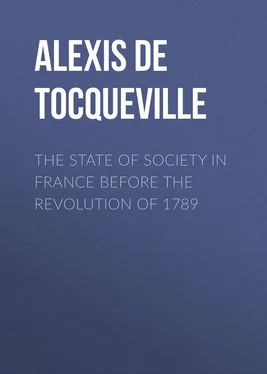Alexis de Tocqueville - The State of Society in France Before the Revolution of 1789
Здесь есть возможность читать онлайн «Alexis de Tocqueville - The State of Society in France Before the Revolution of 1789» — ознакомительный отрывок электронной книги совершенно бесплатно, а после прочтения отрывка купить полную версию. В некоторых случаях можно слушать аудио, скачать через торрент в формате fb2 и присутствует краткое содержание. Жанр: foreign_prose, История, foreign_edu, foreign_antique, на английском языке. Описание произведения, (предисловие) а так же отзывы посетителей доступны на портале библиотеки ЛибКат.
- Название:The State of Society in France Before the Revolution of 1789
- Автор:
- Жанр:
- Год:неизвестен
- ISBN:нет данных
- Рейтинг книги:3 / 5. Голосов: 1
-
Избранное:Добавить в избранное
- Отзывы:
-
Ваша оценка:
- 60
- 1
- 2
- 3
- 4
- 5
The State of Society in France Before the Revolution of 1789: краткое содержание, описание и аннотация
Предлагаем к чтению аннотацию, описание, краткое содержание или предисловие (зависит от того, что написал сам автор книги «The State of Society in France Before the Revolution of 1789»). Если вы не нашли необходимую информацию о книге — напишите в комментариях, мы постараемся отыскать её.
The State of Society in France Before the Revolution of 1789 — читать онлайн ознакомительный отрывок
Ниже представлен текст книги, разбитый по страницам. Система сохранения места последней прочитанной страницы, позволяет с удобством читать онлайн бесплатно книгу «The State of Society in France Before the Revolution of 1789», без необходимости каждый раз заново искать на чём Вы остановились. Поставьте закладку, и сможете в любой момент перейти на страницу, на которой закончили чтение.
Интервал:
Закладка:
It would seem as if, in all human institutions as in man himself, there exists, independently of the organs which manifestly fulfil the various functions of existence, some central and invisible force which is the very principle of life. In vain do the organs appear to act as before; when this vivifying flame is extinct the whole structure languishes and dies. The French nobility still had entails (indeed Burke remarked, that in his time entails were more frequent and more strict in France than in England), the right of primogeniture, territorial and perpetual dues, and whatever was called a beneficial interest in land. They had been relieved from the heavy obligation of carrying on war at their own charge, and at the same time had retained an increased exemption from taxation; that is to say, they kept the compensation and got rid of the burden. Moreover, they enjoyed several other pecuniary advantages which their forefathers had never possessed; nevertheless they gradually became impoverished in the same degree that they lost the exercise and the spirit of government. Indeed it is to this gradual impoverishment that the vast subdivision of landed property, which we have already remarked, must be partly attributed. The nobles had sold their lands piecemeal to the peasants, reserving to themselves only the seignorial rights which gave them the appearance rather than the reality of their former position. Several provinces of France, like the Limousin mentioned by Turgot, were filled with a small poor nobility, owning hardly any land, and living only on seignorial rights and rent-charges on their former estates. 35 35 See Note XXIX., Seignorial Dues in different Provinces of France.
‘In this district,’ says an Intendant at the beginning of the century, ‘the number of noble families still amounts to several thousands, but there are not fifteen amongst them who have twenty thousand livres a year.’ I find in some minutes addressed by another Intendant (of Franche-Comté) to his successor, in 1750, ‘the nobility of this part of the country is pretty good but extremely poor, and as proud as it is poor. It is greatly humbled compared to what it used to be. It is not bad policy to keep the nobles in this state of poverty in order to compel them to serve, and to stand in need of our assistance. They form,’ he adds, ‘a confraternity, into which those only are admitted who can prove four quarterings. This confraternity is not patented but only allowed; it meets only once a year, and in the presence of the Intendant. After dining and hearing mass together, these noblemen return, every man to his home, some on their rosinantes and the rest on foot. You will see what a comical assemblage it is.’
This gradual impoverishment of the nobility was more or less apparent, not only in France, but in all parts of the Continent, in which, as in France, the feudal system was finally dying out without being replaced by a new form of aristocracy. This decay was especially manifest and excited great attention amongst the German States on the banks of the Rhine. In England alone the contrary was the case. There the ancient noble families which still existed had not only kept, but greatly increased their fortunes; they were still first in riches as in power. The new families which had risen beside them had only copied but had not surpassed their wealth.
In France the non-noble classes alone seemed to inherit all the wealth which the nobility had lost; they fattened, as it were, upon its substance. Yet there were no laws to prevent the middle class from ruining themselves, or to assist them in acquiring riches; nevertheless they incessantly increased their wealth; in many instances they had become as rich as, and often richer than the nobles. Nay, more, their wealth was of the same kind, for, though dwelling in the town, they were often landowners in the country, and sometimes they even bought seignorial estates.
Education and habits of life had already created a thousand other points of resemblance between these two classes of men. The middle class man was as enlightened as the noble, and it deserves to be remarked, his acquirements were derived from the very same source. The same light shone upon both. Their education had been equally theoretical and literary. Paris, which became more and more the sole preceptor of France, had ended by giving to all minds one common form and action.
At the end of the eighteenth century no doubt some difference was still perceptible between the manners of the nobility and those of the middle class, for nothing assimilates more slowly than that surface of society which we call manners; at bottom, however, all men above the rank of the common people were alike; they had the same ideas, the same habits, the same tastes; they indulged in the same pleasures, read the same books, and spoke the same language. The only difference left between them was in their rights.
I much doubt whether this was the case in the same degree anywhere else, even in England, where the different classes, though firmly united by common interests, still differed in their habits and feelings; for political liberty, which possesses the admirable power of placing the citizens of a State in compulsory intercourse and mutual dependence, does not on that account always make them similar; it is the government of one man which, in the end, has the inevitable effect of rendering all men alike, and all mutually indifferent to their common fate.
CHAPTER IX
Let us now look at the other side of the picture, and we shall see that these same Frenchmen, who had so many points of resemblance amongst themselves, were, nevertheless, more completely isolated from each other than perhaps the inhabitants of any other country, or than had ever been the case before in France.
It seems extremely probable that, at the time of the first establishment of the feudal system in Europe, the class which was subsequently called the nobility did not at once form a caste , but was originally composed of the chief men of the nation, and was therefore, in the beginning, merely an aristocracy. This, however, is a question which I have no intention of discussing here; it will be sufficient to remark that, during the Middle Ages, the nobility had become a caste, that is to say, that its distinctive mark was birth.
It retained, indeed, one of the proper characteristics of an aristocracy, that of being a governing body of citizens; but birth alone decided who should be at the head of this body. Whoever was not born noble was excluded from this close and particular class, and could only fill a position more or less exalted but still subordinate in the State.
Wherever on the continent of Europe the feudal system had been established it ended in caste; in England alone it returned to aristocracy.
It has always excited my surprise that a fact which distinguishes England from all other modern nations, and which alone can throw light upon the peculiarities of its laws, its spirit, and its history, has not attracted to a still greater degree the attention of philosophers and statesmen, and that habit has rendered it, as it were, imperceptible to the English themselves. It has frequently been seen by glimpses, and imperfectly described, but no complete and distinct view has, I believe, ever been taken of it. Montesquieu, it is true, on visiting Great Britain in 1739, wrote, ‘I am now in a country which has little resemblance to the rest of Europe:’ but that is all.
It was indeed, not so much its parliament, its liberty, its publicity, or its jury, which at that time rendered England so unlike the rest of Europe; it was something far more peculiar and far more powerful. England was the only country in which the system of caste had been not only modified, but effectually destroyed. The nobility and the middle classes in England followed the same business, embraced the same professions, and, what is far more significant, intermarried with each other. The daughter of the greatest nobleman could already without disgrace marry a man of yesterday.
Читать дальшеИнтервал:
Закладка:
Похожие книги на «The State of Society in France Before the Revolution of 1789»
Представляем Вашему вниманию похожие книги на «The State of Society in France Before the Revolution of 1789» списком для выбора. Мы отобрали схожую по названию и смыслу литературу в надежде предоставить читателям больше вариантов отыскать новые, интересные, ещё непрочитанные произведения.
Обсуждение, отзывы о книге «The State of Society in France Before the Revolution of 1789» и просто собственные мнения читателей. Оставьте ваши комментарии, напишите, что Вы думаете о произведении, его смысле или главных героях. Укажите что конкретно понравилось, а что нет, и почему Вы так считаете.












